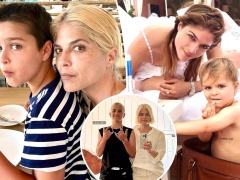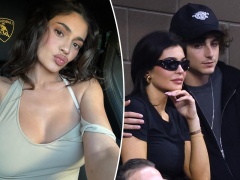
Ashley Graham has been dealing with body-shaming bullies since junior high.
“In middle school the kids called me ‘cottage cheese thighs,’” Graham, 36, wrote in an essay published by Time on Wednesday, noting that she had “always been a larger kid — stout, athletic.”
“I craved acceptance of others and the empathy of a friend group that might understand what I had to offer beyond my exterior,” she added.



Celebrities attend the F1 Monaco Grand Prix: Emily Ratajkowski, Joe Jonas and more

Ashley Graham says ‘not much has changed’ for size inclusivity in fashion

Ashley Graham claims gua sha is better than filler, Botox for perfect skin
Graham explained that, like many women, her “sense of self” was attributed to the “influence of feedback from others.” That is, until she “suddenly” became a successful model.
“A scout spotted me at the mall in Omaha when I was 12,” she recalled. “Soon I was being paid to have my picture taken. Adults were telling me that my looks had value.”
But the Sports Illustrated Swim covergirl noted that her beauty came with a “caveat.”
“I was ‘big pretty’ or ‘pretty for a big girl’ or ‘pretty from the neck up.’ There was always that double label: pretty and plus-sized,” she said.



The “A New Model“ author recalled teachers being baffled and her peers being nasty when she started pursuing her modeling career.
“In school, the plus-size wasn’t cool, but the pretty was interesting,” she said. “My teachers would tilt their heads and squint at me, looking for whatever the industry saw. I would fly to modeling jobs in New York City over the weekend with my mom, and be back in school facing the name-calling on Monday.”
Looking back, Graham wished she had a mentor to help her understand her value and purpose as a model.


“But there was no one I could look to and emulate, no one who’d gone through the same challenges to hold my hand and tell me that none of the noise mattered, that I just needed to keep moving forward,” she remembered.
Graham ultimately found self-confidence later in life, though she admits that she still struggles sometimes.
“There isn’t one top model who doesn’t live with some sort of insecurity,” she said. “You could talk to any of them, and I bet they would tell you all about it. We’re constantly being picked apart, constantly being told what’s right with how we look and what’s wrong, how we aren’t meeting the bar, what we need to change about ourselves.”


The brutal realities of the fashion industry almost made her quit life as a model when she was 18.
“One day I finally called my mom crying, looking in the mirror and just feeling like I couldn’t do it anymore,” Graham said. “She told me something I’ll never forget: ‘Your body is going to change someone’s life. You have to keep going.’”
This was the “aha” moment that finally allowed Graham to realize her “purpose” in modeling.


“As I let her words sink in, I thought about how for years I’d let other people tell me who I was. I needed to define my worth for myself. And I could use words, like my mom had, to do it,” she said.
Graham discovered the practice of “affirmations” and would tell herself that she is “bold,” “brilliant,” and “beautiful.”
“Bold because I’d always been told I was too much — too big, too loud, too much personality — but I knew that my intensity and presence is what would set me apart,” she said. “Brilliant because I was diagnosed with ADHD and dyslexia in the fourth grade and never had the resources I needed to really thrive in school — but I knew that I was smart and capable.”


She continued, “Beautiful because I was starting to learn the fuller definition of the word, that beauty is about so much more than the parts of myself that were commoditized.”
Graham was able to develop “self-love” after doing affirmations for more than a decade. Still, she suffers from “waves of imposter syndrome” on hard days.
“My body has changed things for other people, and there’s an incredible honor — and an incredible pressure — that comes with knowing that,” she said. “I’ve always wanted women to see themselves in me, to know that any validation I get is equally theirs.”


While Graham has found so much support from her community, she admitted that her fans sometimes “assume ownership” over her appearance, which is constantly changing.
“We all change. I was 28 when I appeared on the cover of Sports Illustrated Swimsuit. Now I’m 36 and a mother of three,” she said. “My body looked different when I was pregnant, and it looks different now that I’ve given birth to my three sons.”
Some of her followers felt “betrayed” after she lost weight following the birth of her children.


“Maybe I’ll lose weight, maybe I’ll gain it. This is my body, and I’m incredibly proud of everything it has accomplished,” she continued.
“I never want women to think I’m leaving them behind, and at the same time, all I can do is accept the journey I’m on and to focus on the things that make me feel strong and empowered — which is all any of us can do.”
Graham shares three children — Isaac, 4, and 2-year-old twins Malachi and Roman — with her husband, Justin Ervin, whom she married in 2010.






